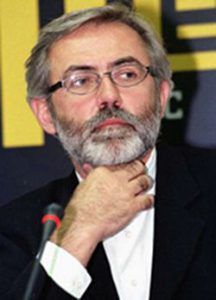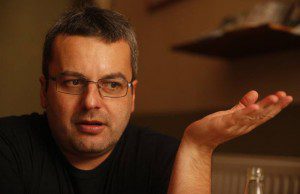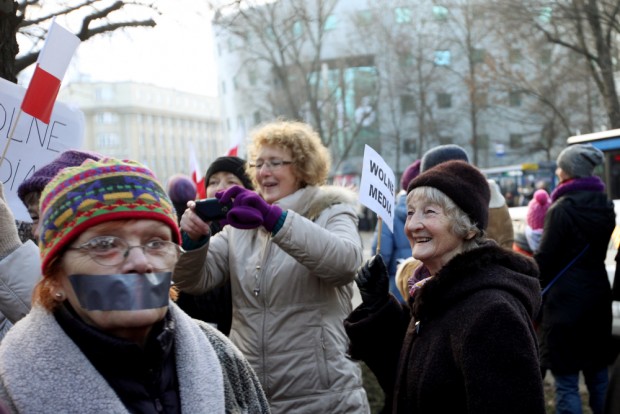Index relies entirely on the support of donors and readers to do its work.
Help us keep amplifying censored voices today.
[vc_row][vc_column][vc_single_image image=”104453″ img_size=”full” add_caption=”yes”][vc_column_text]Additional reporting by Ada Borowicz, Ilcho Cvetanoski, Lazara Marinković and Zoltán Sipos
The opening volley in a sustained campaign of vilification directed at Serbia‘s independent media was fired by the state-owned weekly Ilustrovana Politika at the end of October, with an article that accused journalists who are critical of the government of being “traitors and collaborators with the enemies of Serbia”.
Two weeks later, Ilustrovana Politika followed up with another piece that accused the veteran journalist Ljiljana Smajlović – who has long been critical of the nationalistic legacy bequeathed on the country by its former leader Slobodan Milosević and co-founded the Commission Investigating the Murders of Journalists in Serbia – of complicity in the 1999 NATO bombing of Belgrade.
In mid-December, Ilustrovana Politika’s campaign of character assassination against Smajlović ratcheted up another level with a garish front page depicting her as a Madonna figure with two naked infants bearing the features of Veran Matić, the chairman of the commission, and US Ambassador to Serbia Kyle Scott.
Smajlović has no doubt over what lies behind this tidal wave of denigration, of which she has become the prime target.
History repeating itself?

Editor Slavko Ćuruvija was murdered in 1999.
The long-running trial of four ex-members of the Serbian intelligence service accused of the murder of Dnevni Telegraf editor Slavko Ćuruvija – shot dead in April 1999 a few days after the pro-government Politika Ekspres accused him of welcoming the NATO bombardment – is now in its final stages, and Smajlović is convinced that the current campaign against her is designed to influence the judges in the case.
“The attacks come from the same Milosevic-era editors who also targeted my colleague Ćuruvija as a traitor prior to his assassination,” she told Mapping Media Freedom. “What is also sinister is that they are published and printed by the same state-owned media company that targeted Slavko nearly twenty years ago.”
“The clear implication is that I am the same kind of traitor as he was. How will that affect the judges? Will they fear this is not a good time to hold state security chiefs to account?” she added.
While Smajlović admits that Ilustrovana Politika’s denunciation has made her feel insecure, she insists she is less concerned for her own safety than worried about the consequences for the outcome of the Ćuruvija trial. Quoting Marx’s dictum that “History repeats itself, first as tragedy and then as farce”, Smajlović said. “I hope this is the farce part.”
Laying the blame
In Serbia and other central and eastern European countries, the assignment of responsibility for historic causes of resentment and the potential of these to further divide a polarised public often form the background to attacks on independent journalists by their state-approved colleagues.
The thorny topic of Poland’s relations with Germany during the last century recently gave pro-government media in Poland a chance to accuse independent media of being insufficiently patriotic and even of falsifying facts.

Journalist Bartosz Wieliński was targeted by the head of TVP Info’s news site.
In November, after Bartosz Wieliński, a journalist with the independent daily Gazeta Wyborcza, gave a critical account of a speech made by the Polish ambassador to Berlin at a conference devoted to the centenary of Poland’s independence, the head of the state broadcaster’s news website, TVP Info, accused him of lying and of putting the interests of Germany before those of his own country.
Only a few days before this attack, two media outlets that support Poland’s ruling national-conservative Law and Justice (PiS) party accused the independent US-owned channel TVN of fabricating the evidence on which a report about the resurgence of neo-Nazism in Poland was based.
Since it came to power in 2015, PiS – which has been accused by its critics of tolerating organisations that espouse far-right ideologies – has put pressure on independent media outlets, many of which are foreign-owned, as part of its campaign to “re-polonise” the media, and now appears to be using the public broadcaster and other tame outlets as accessories in this drive.
Willing accomplices
In Hungary, where the government led by Viktor Orbán has succeeded in imposing tight control on all but a few determinedly independent media outlets, a number of loyal publications are available for the purposes of vilification.

2015 Freedom of Expression Journalism Award winner Tamás Bodoky, founder of Atlatszo.hu
In September, a whole raft of pro-government media outlets vied with each other to depict Tamás Bodoky, the editor-in-chief of the investigative journalism platform Átlátszó and winner of the 2015 Index on Censorship Freedom of Expression Award for Journalism, as a “Soros hireling”. Bodoky became the target of a co-ordinated smear campaign after he posted on Facebook a picture of himself taken in Brussels with Dutch Green MEP Judith Sargentini, whose report on the Fidesz government’s infringement of core EU values had formed the basis for the European parliament’s censure motion against Hungary a few weeks earlier.
Another Hungarian journalist, András Dezső, who works for the independent news website Index.hu, also recently came under attack from pro-government media outlets after a Budapest court let him off with a reprimand over a case in which he was alleged to have made unauthorised use of personal information. In an article published before April’s general election, Dezső had cast doubt on the account of a woman who declared on Hungarian TV that she felt safer in Budapest than in Stockholm because of the lower level of immigration in Hungary. The airing of the interview by the public broadcaster was seen as providing support for Fidesz’s anti-immigration stance and aiding its election victory.
A criminal charge was issued against Dezső for “misuse of personal data”, and after he received what was described in the Hungarian media as “the mildest possible punishment”, two pro-government news websites, 888.hu and Origo.hu, accused him of deliberately propagating fake news and seeking to mislead his readers.
Why do they do it?
What motivates those journalists who smear their colleagues who seek to hold power to account?
There does not appear to be a simple answer to this question. While some may vilify fellow journalists to order purely for financial gain (or because of a desire for job security, government-sponsored media outlets generally being on a more secure financial footing than their independent counterparts), some appear to approach the task with at least a measure of conviction.
Ilcho Cvetanoski, who reports on Bosnia, Croatia, Macedonia and Montenegro for Mapping Media Freedom and has observed many smear campaigns over the years, believes that financial and ideological motivating factors are often inextricably intertwined. He points out that two decades on from the armed conflicts in the region, Balkans societies are still deeply divided along ideological and ethnic lines, and many people still find it extremely difficult to accept the right of others to see things differently. Cvetanoski notes that there are many “true believers” who are genuinely convinced that they have a duty to defend their country from the “other” – a group in which they tend to lump critical journalists along with mercenaries, spies and traitors.
Lazara Marinković, who covers Serbia for Mapping Media Freedom, believes that the main motivation there is a need to be on the winning side and to please those in power. “Often they actually enjoy doing it, either for ideological reasons or because they feel more powerful when they are on the side of the ruling party,” she told Mapping Media Freedom. Marinković noted that the majority of Serbian tabloids and TV stations that conduct smear campaigns against independent journalists are owned by businessmen who have close links to President Aleksandar Vučić’s national conservative Serbian Progressive Party (SNS). Vučić began his political career during the Milosević era, when he served as Minister of Information.
In Poland, the divisions in society and the consequent lack of tolerance in political culture have been blamed for the increasing polarisation of the media. Michal Głowacki, a professor of media studies at Warsaw University, told Mapping Media Freedom that journalists take their cue from politicians in failing to show respect for fellow journalists associated with the “other side”. “They even use the same language as politicians,” Głowacki notes.
This is a view echoed by Hungarian journalist Anita Kőműves, a colleague of Bodoky’s at Átlátszó. Kőműves, however, insists that while journalists who work for independent media outlets strive to uphold the principles of journalistic ethics, the same cannot be said of those employed by pro-government outlets. “Some of those serving the government at propaganda outlets think that the two ‘sides’ of the Hungarian media are equally biased and that they are not acting any differently from their counterparts in the independent media sphere. However, this is not true: pro-government propaganda outlets do not adhere to even the basic rules of journalism,” she told Mapping Media Freedom.[/vc_column_text][vc_raw_html]JTNDaWZyYW1lJTIwd2lkdGglM0QlMjI3MDAlMjIlMjBoZWlnaHQlM0QlMjI0MDAlMjIlMjBzcmMlM0QlMjJodHRwcyUzQSUyRiUyRm1hcHBpbmdtZWRpYWZyZWVkb20udXNoYWhpZGkuaW8lMkZ2aWV3cyUyRm1hcCUyMiUyMGZyYW1lYm9yZGVyJTNEJTIyMCUyMiUyMGFsbG93ZnVsbHNjcmVlbiUzRSUzQyUyRmlmcmFtZSUzRQ==[/vc_raw_html][vc_basic_grid post_type=”post” max_items=”4″ element_width=”6″ grid_id=”vc_gid:1545385969139-cb42990e-b3e2-3″ taxonomies=”9044″][/vc_column][/vc_row]

9 January, 2016: An anti-PiS demonstration in Kraków by the Committee of the Defence of the Democracy calling for a free media. Credit: Shutterstock / praszkiewicz
Poland has undergone rapid changes since the right-wing Law and Justice party (PiS) won the overall majority in the Sejm, the country’s parliament, in October 2015, and independent media hasn’t been spared.
On the evening of 28 December, draft legislation to change the management of public media was submitted to the Sejm and hurriedly passed with little public discussion and despite the objections of EU and media monitoring watchdogs — including Index on Censorship. The bill was signed into law in early January 2016.
Even before the parliamentary debate on the bill, PiS MP Beata Mazurek let it be known that it was her “hope that, at last, the media narration which we disagree with, will cease to exist”.
Crucial sections of the media law empowered the government to appoint editors-in-chief at public radio and stations, Polskie Radio and TVP, rather than holding an open competition for the roles. Furthermore, the law ended member rotation on public television’s watchdog committee and symbolically re-branded “public media” as “national media”.
Immediately after enacting the law, the government named Jacek Kurski — a long-standing PiS member who represented the party in the Sejm between 2005-2009 and in the European Parliament until 2014 — as the new chair of TVP. He promised a “fast recovery” of public media on taking the role.
In speaking about the law, PiS representatives have said that the media had been under heavy influence of the Civic Platform (PO), the former governing party. In an interview with the Catholic Radio Maryja and TV station Trwam, defence minister Antoni Macierewicz said: “PiS does not take freedom of speech away from anyone, it is much rather the opposite: it returns the freedom of speech to the majority of the population, which had been deprived of it.”
The electoral success of PiS has been used to frame the changes to the media law as an expression of the public will.
The national daily Gazeta Wyborcza, which in 1989 was the first newspaper published outside the control of Poland’s then-communist government, and its workforce took these changes very seriously and set up an advertising campaign focused on the new legislation.
The changes to the media law raise a fundamental issue for media aligned to the political left or centre, as well as those with pro-European or liberal positions: financing.
Paweł Grzegorczyk, editor-in-chief of the online portal jagielloński24, conducted an analysis of public funding channelled to media outlets in recent years. In an interview with the Association of Polish Journalists (SDP), he said that Gazeta Wyborcza is likely to face a challenging financial future. Regardless of which party is in power, media funding is “usually steered, while not exclusively, by political motives”, he added.
He noted that right-wing publishers, under PO rule, had received less funding both with regards to the amount of publications (only two between 2009-14) and monetary value, than publications closer to the former government. While overall figures are not published, Gazeta Wyborcza received PLN 5 million ($1,284,076) between 2010-2014. Grzegorczyk said it wouldn’t be unreasonable to see this amount diminish in future.
Since PiS gained a majority, advertising by state institutions has soared in a number of media aligned with conservative political viewpoints, and the oil refinery company Orlen is sponsoring some news programming on Telewizja Republika, according to Grzegorczyk.
Commentators have been cautiously optimistic about the changes to the media law, calling it an opportunity to shake up dysfunctional structures in public media. “It was never as bad with the TVP as it is now, and it will never be as bad again,” wrote Stefan Turszczynski, a journalist and SDP member. Jadwiga Chmielowska wrote that Polish television has been destroyed in a 20-year process and the new media law “constitutes a chance” for change. Despite the optimism, some TVP journalists have already been dismissed.
So far commentary has focused the media law’s effect on Polish TV because Poles, on average, watch 4.23 hours a day, a Europe-wide high.
The Press Freedom Monitoring Centre (CMWP) issued a statement appealing “to editors-in-chief of public stations to pay particular attention that personnel changes would exclusively be motivated by criteria of professionalism of certain journalists or media employees”, rather than be based on family relations or political considerations.
In an interview with news-servis.pl Witold Świetlik, chair of CMWP, appeared unconcerned about the changes given that “the public media have never been that good in Poland”, and had increasingly been influenced by the surroundings of former President Bronisław Komorowski. Something had to change, and Świetlik was hopeful to see more pluralism of opinion than there was on TVP previously. One example he cites is the TVP talk show hosted by journalist Tomasz Lis, who was one of the first to leave the station following the introduction of the new media law. While Świetlik’s “fundamental doubt” concerned the fact that a politician is now leading the TV station, he noted that Kurski has so far “set up a rather neutral and pluralistic composition”, while admitting that the workforce was, “of course, predominantly made up from journalists of the conservative media”.
The position heard directly from associates of the SDP on the state of Polish public TV was very negative prior to the new law being passed. Former TVP1 departmental editor-in-chief Ewa Urbanska argues that the leasing structure set up a few years back had a detrimental impact on quality of coverage while a large body of administrative staff continued to be supported by public money, and, crucially, any production was left to commercial firms.
Outside criticism of the media landscape in Poland is rejected by some, such as the lawyer and journalist Andrzej Draminski. He is amused by the agitation of “oppositional groupings and various committees in defence of one thing or another (here you can insert any title as this really does not make a difference)” and warns the opposition not to buy in to the “sudden”, shallow interest of the West, and instead to present arguments of their own, “so far as they have any”.
The issues affecting journalism in Poland predate the changes to the media law. The industry has been grappling with accusations of becoming too simple and partisan from its own professionals. Marek Placzewski from the SDP says while there have been a few notable exceptions, the general trend in the press has been to recount right- or left-wing arguments without an attempt to move beyond these narratives.
This article was originally published on Index on Censorship.
Mapping Media Freedom
|
Belarusian journalist Andrzej Poczobut was detained last night for allegedly insulting the country’s president, Alexander Lukashenko. Poczobut writes for Polish daily Gazeta Wyborcza, and now faces up to five years in prison. According to his wife, police raided the couple’s apartment, and confiscated the journalist’s computer. Last year, Poczobut was handed a suspended sentence for articles he wrote against Lukashenko. Officers reportedly told his wife that they would “not leave him alone” if he continues to criticise the president.
Andrey Pochobut, a correspondent for the Polish newspaper GazetaWyborcza who stands accused of defamation and “insulting the president”, is facing a four-year prison sentence. The trial began yesterday in Leninski district court, Belarus, with journalists and family members excluded from proceedings. There are now serious concerns over whether Pochobut will receive a fair trial. The offending articles appeared on the Gazeta Wyborcza website, the Belaruspartisan.org site and in his personal blog. Pochobut would be the fourth journalist sent to prison on a charge of “insulting the president” if he is found guilty. The trial continues.